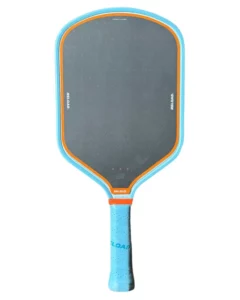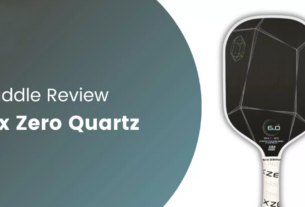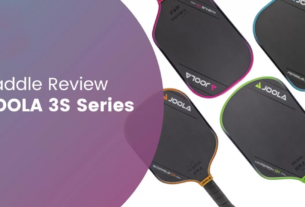Paddle technology has seen remarkable advancements in recent years, offering a wider range of paddle types that enhance spin, forgiveness, and power. However, one area that remains a challenge is paddle durability, particularly the durability of the paddle grit. Regardless of the brand or model, the textured surface or paint grit on your paddle tends to smooth out after just a few months of regular play, losing its ability to generate spin. In fact, if you play frequently and hit hard, you might notice this wear happening even faster. To see for yourself, just feel the center and edges of your current paddle—you’ll likely notice a difference in the grit levels, especially in the sweet spot.
While these technological improvements have been beneficial, they also lead to higher prices. It can be frustrating to invest $150 to $300 in a paddle that only maintains its peak spin performance for a limited time. That’s why I was thrilled to discover what Reload is doing to tackle the issue of spin loss. Their innovative approach is unlike anything I’ve seen before, and I’m excited about the potential impact on the game.
To address spin loss, Reload has developed replaceable face sheets that you can easily peel off and stick onto your paddle whenever you need to refresh the grit. This means you won’t have to buy a whole new paddle just to regain that fresh texture. Their “Reloads” not only look and feel like raw surface paddles, but they also perform similarly, maximizing spin potential. This innovation is truly impressive, and I believe it could change the market. As a consumer, I want my paddle’s peak performance to last longer, and Reload seems to offer a viable solution to achieve that.
As I approached this review, I had four key questions to answer in order to determine whether these replaceable sheets would meet my expectations. Here are the questions I wanted to explore:
- Do the face sheets spin the ball as effectively as other raw textured paddles?
- Are the face sheets durable? Specifically, will they peel off during play or bubble up in the heat?
- Is the paddle that comes with the face sheets any good?
- What does the warranty look like? If you can keep replacing the facing layer, how does that affect the longevity of the base paddle in case it breaks?
After more than two weeks of playing, drilling, and testing the paddle, I’m ready to share the answers to my questions.
How does the Reload system work?
Reload refers to both the brand and the replaceable skins or sheets they use. Currently, they offer one paddle model called the RLD-1. When you purchase the RLD-1, you receive a complete paddle that includes the paddle base and grit sheets already applied, along with an extra set of Reload sheets. The cost for the paddle is $200, or $180 if you use my discount code 10EFFECT.
Once you have the paddle base, you can buy additional Reload sheets in either single or three-pack options. When the sheets begin to smooth out—something I estimate happens after 2 to 5 months depending on your playing frequency and intensity—you simply peel off the old sheets and apply a fresh set. It’s that easy! Reload sheets are priced at $50 for a single pack or $130 for a three-pack, and my discount code 10EFFECT can also be applied to these sheets.
While the initial cost of the Reload sheets might seem high, it’s a great deal when you compare it to the price of replacing an entire paddle for fresh grit. Here’s how I see the pricing breakdown, which highlights the cost-effectiveness of this system.
I appreciate that the sheets are integrated into the paddle system rather than being an add-on over an existing grit surface. This design ensures you get the same performance every time you switch out the face sheets, and it doesn’t add unnecessary weight to the paddle. Overall, it’s a smart and practical solution.
Do the face sheets spin the ball as well as other raw textured paddles?
To answer this question, I conducted a spin test. Having tested over a hundred paddles, I track my results in a paddle database. For each paddle, I perform ten serves, aiming to maximize spin, and then measure the Revolutions Per Minute (RPM) using a Stalker Pro 3S radar gun. This tool allows for accurate measurements, which I average to determine the paddle’s spin potential. The Reload paddle averaged 1975 RPM, and I consider any paddle above 1950 RPM to be a good spin paddle.
Most modern paddles I’ve tested typically score above 1950 RPM, with the best ones averaging around 2000 RPM and the less effective ones hitting the high 1800s. So, does the Reload paddle produce spin comparable to other raw textured paddles? Absolutely—check!
Are the face sheets durable?
Since the skins are essentially stickers, I was curious about how well the adhesive holds up under stress. Applying a new skin is straightforward: you peel off the old one, revealing a flat, textured surface, and then apply the new face sheet.
For this review, I played and drilled with the paddle for two weeks, both outdoors and indoors, totaling six sessions and 12 hours of play. While I recognize that others might use it even more, my testing was substantial enough to assess durability. During this period, I encountered no issues—no bubbling or lifting at the edges. Additionally, I left the paddle outside in the summer heat for over two hours, and it held up perfectly. There was no bubbling, and when I removed the sticker, there was no residue left behind.
Based on my limited testing, I did not experience any durability issues. As these sheets enter the market, we’ll quickly learn if any problems arise from extended use, but for now, they seem to be performing well.
Is the paddle any good?




